Committee advances transgender treatment ban for minors
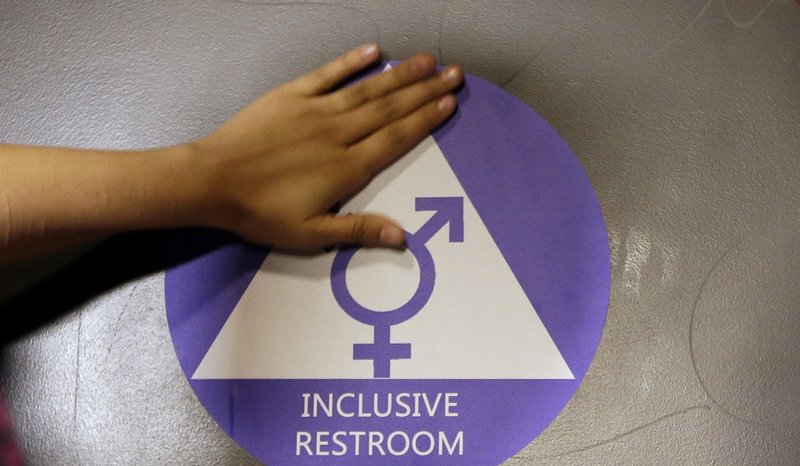
An Alabama House of Representatives on Wednesday advanced a bill that would make it a felony for doctors to treat transgender youth with hormonal therapy and puberty blockers to help their transition. The House Judiciary Committee approved the bill on an 11-3 vote, putting it in line for a floor vote in the House of Representative. The Senate Health Committee earlier approved a Senate version of the bill. Alabama is one of at least eight states where conservative lawmakers are pushing such measures, arguing such decisions should wait until adulthood. Parents of transgender teens spoke out against the bill in a public hearing earlier this month. The bills introduced in the Alabama Senate and Alabama House of Representatives would prohibit the use of puberty-blocking drugs, hormonal therapy and surgery to treat transgender minors. Violators could face up to 10 years in prison. Republished with the permission of the Associated Press.
Alabama lawmaker files bill to protect children from gender reassignment treatments
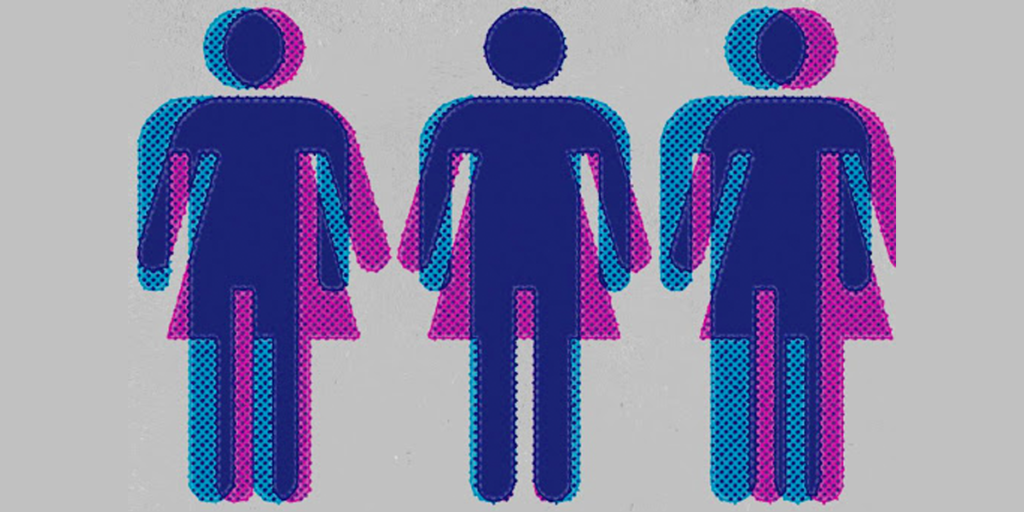
A new bill in Alabama would make it illegal for doctors to prescribe puberty blocking medications or opposite gender hormones to minors. The proposed legislation would also ban radical surgeries, such as hysterectomies, mastectomies or castrations, from being performed on minor children. Troy- Republican, State Rep. Wes Allen filed HB 303: the Alabama Vulnerable Child Compassion and Protection Act (VCPA) in the Alabama House of Representatives on Thursday. The legislation would make it a Class C felony that punishable by up to 10 years in prison. “I was shocked when I found out doctors in Alabama were prescribing these types of drugs to children,” Allen said. “This is something you hear about happening in California or New York but it is happening right here in Alabama and it’s time we put a stop to that practice.” Allen recognizes there are children who are struggling with psychological disorders, such as gender dysphoria that causes them to be confused about their gender identity but he believes that we should help those children with therapeutic treatment from qualified mental health professionals, not allow these children’s bodies to be permanently mutilated. “Gender dysphoria is a real disorder. It’s listed in the DSM-5, published by the American Psychiatric Association, which lists all recognized mental disorders,” Allen explained. “These children are suffering from a psychological disorder, just as someone who is suffering with bipolar disorder or schizophrenia but we treat those patients and try to help them. We should treat these psychological disorders as well.” The legislation also requires that parents be notified by school officials if those officials learn that a child has gender dysphoria. Allen noted many of the puberty blocking medications and opposite gender hormones being prescribed to Alabama children have irreversible consequences including sterilization, liver disease and increased risk for cancer. Allen further explained that the FDA has never approved the use of puberty blocking medications for the treatment of gender dysphoria. “These patients are children who have not reached physical or mental maturity,” he added. “It is irresponsible to permanently mutilate them at their request or at the request of their parents. We don’t allow minors to enter into contracts, buy alcohol or get a credit card because they aren’t capable of making those decisions and we should not allow them to do this either.” On Friday, the conservative Eagle Forum of Alabama came out in support of Allen’s legislation. “We support this bill because it protects vulnerable children who are suffering from gender dysphoria from irreversible medical procedures that will alter their bodies for life,” said Eunie Smith, President of Eagle Forum. “The brain’s frontal lobe that is responsible for emotional expression, problem solving, memory, language, judgment, and sexual behaviors is not fully developed until age 25. Therefore, many minors are making life-altering decisions which may render them sterile for life, cause serious bone loss, and decreased cognitive development from hormone therapy. Other harmful effects are not fully known. Children must be helped; not harmed.” At least six states nationwide have introduced similar “vulnerable child” legislation in the 2020 legislation session.Sen. Shay Shellnut has introduced a companion bill, SB 219, in the Alabama Senate. Allen’s bill will be considered by the Alabama House of Representatives in the coming weeks.
Lawmakers advance bill aimed at transgender athletes

The bill will next be voted on by the full House of Representatives.
Bill would bar transgender students from some sports teams
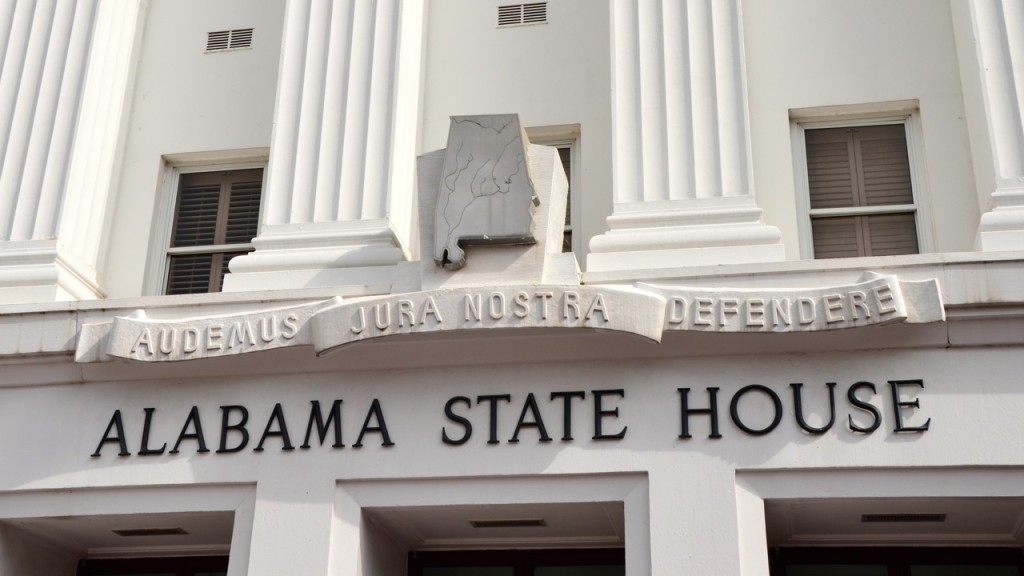
The bill would require student athlete’s under “the gender assigned at their birth,” according to the bill’s sponsor, Rep. Chris Pringle.
Federal court considers bathroom use by transgender student
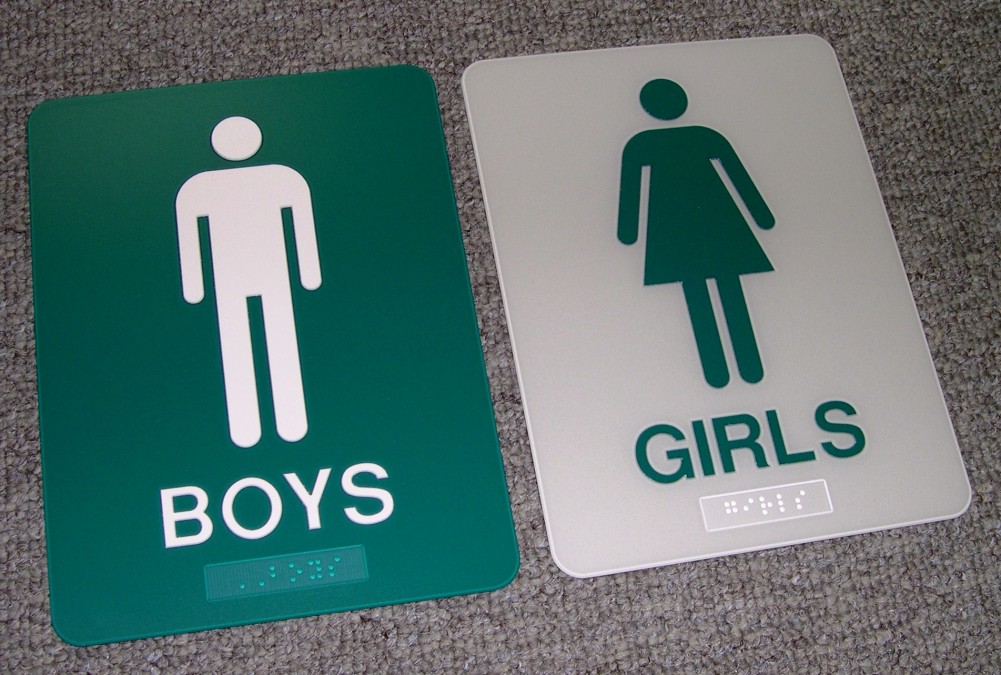
A student has the right to use the bathroom that corresponds to his gender identity, a lawyer told a federal court Thursday, arguing that the issue is about the right of transgender students to “equal dignity.” But the Florida school district that’s appealing a lower court order in favor of the transgender boy told three judges on the 11th U.S. Circuit Court of Appeals that they should overturn the ruling and let the school district restrict students to the bathroom matching their at-birth sex to protect the privacy of other students. The case involves Drew Adams, who has since graduated from Nease High School outside Jacksonville. Adams transitioned from a girl to a boy before his freshman year, and used the boys’ room at the Ponte Vedra, Florida, school for a few weeks before several girls complained. Administrators barred him from the boys’ restroom and instead steered him toward single-user gender neutral restrooms. A lower court last year overturned that policy after a bench trial, ordering the St. Johns County school district to let Adams use the boys’ restroom. The 11th Circuit could become the first federal appeals court to issue a binding ruling on the issue, which has arisen in several states. The ruling would cover schools in Florida, Georgia and Alabama, and could carry the issue to the U.S. Supreme Court. The 4th Circuit had ruled in favor of a transgender Virginia student, but the U.S. Supreme Court sent the case back down for further consideration after the U.S. Department of Education, under President Donald Trump, withdrew guidance that said federal law called for treating transgender students equally, including allowing them to use the bathroom that matches their gender identity. All the parties in the Atlanta courtroom Thursday were aware of the possibility that the ruling will set an important precedent. Lawyer Tara Borelli of Lambda Legal, who represents Adams, said after the hearing she was hoping schools will get “a clear statement that the law requires that transgender students be treated equally.” But Circuit Judge Bill Pryor hammered Borelli, asking her how the judges could uphold the lower court ruling without setting the stage to allow anyone to ask for access to any bathroom or finding all sex-based distinctions illegal. “These rationales apply to any form of sex-based segregation,” Pryor said. Borelli, though, repeatedly underscored that Adams is not seeking to abolish distinctions between men and women. “This case is only about me, a boy, being allowed to use the boys’ bathroom,” Adams said after the hearing, echoing what Borelli told Pryor. Adams, now a student at the University of Central Florida, told reporters that he’s never had a problem using a men’s bathroom. “Before this became an issue, nobody knew who I was, nobody cared what bathroom I used,” Adams said. “Most people when they use the bathroom, don’t look twice at who’s in there with them. So, this really wasn’t an issue until the school board made it an issue.” A lawyer for St. Johns County urged judges to reverse the ruling and uphold the policy restricting students to the bathroom of their at-birth sex, saying the trial court judge overstepped. “Differences between the sexes are real and it necessitates this kind of separation between the sexes,” lawyer Jeff Slanker told judges. “This has always been the way it’s been done.” Judge Beverly Martin repeatedly asked Slanker if he could provide any specific complaints that spurred the policy. Slanker could not, saying the school district acted “proactively” to protect students’ privacy interests. The trial judge rejected this argument, finding that Adams would use a stall and that no breach of privacy would occur. Borelli told judges the district’s policy would “heap discrimination on transgender students.” “There is no recognized right in the law to not have to share space with transgender students,” she argued. Follow Jeff Amy on Twitter at https://twitter.com/jeffamy. Republished with the Permission of the Associated Press.
Danna Hall McCain: Transgender activism puts vulnerable children in cross-hairs of progressive agenda

A recent case in the Texas courts became a catalyst for loud debate regarding the intersection of parental rights and appropriate treatment for gender dysphoria in children. A 7-year-old child of divorced parents, born male, is believed by his mother to be transgender and that his desire to be female should be affirmed. The father denies the claim that the child consistently asserts a female identity and says that the types of treatment the mother would approve for him are not in the child’s best interest. An initial ruling granted sole conservatorship to the mother, giving her full control of the type of medical and mental health treatment the child would receive. A later court ruling turned that on its head by granting joint custody to the parents, creating a situation wherein they must agree about the best care for the child. Transgender activism is the newest and most aggressively pursued cause of cultural progressives. A term we rarely heard a decade ago is now in the headlines every day, whether it relates to public restrooms, women’s sports or child custody cases like the one in Texas. But multiple things have been conflated in the debate in a way that clouds careful examination of the moral, ethical and public health questions at hand. The first hurdle is understanding the nature of gender dysphoria. This type of inner conflict regarding personal gender identity has long been recognized by mental health experts as a mental disorder and was listed in the DSM (the diagnostic manual which defines all mental health conditions) as “Gender Identity Disorder.” However, with the release of DSM-5 in 2013, it was renamed “Gender Dysphoria” to destigmatize the condition. Why is this significant? Because the cultural progressives of the American Psychiatric Association decided that a total disconnect between one’s obvious biologically-determined sex and one’s psychological recognition and acceptance of that same gender is not an anomaly in need of correction. They wanted to move the mental health and medical communities away from seeing this as a tragic mental health disorder, and toward seeing it as an alternative way of being, that can and should simply be affirmed in many cases. The American Academy of Pediatrics has lurched quickly forward with its views and recommendations on the issue, as well. But reason and science are stubborn things, and as yet, they refuse to get on the bus with the APA and the AAP for this journey. Let me pause here to say this: my heart breaks for individuals who suffer, and for parents whose children suffer with gender dysphoria. It is often accompanied by other mental health struggles like depression and anxiety, and I can only imagine the desperate desire a parent would feel to alleviate that psychological pain for their child. So those of us who observe and comment on this issue must do so with compassion. To approach it with the harshness or dismissiveness that often characterizes our culture wars is wrong. But just as we would never look a person whose mental health condition predisposed him or her to some other sort of delusion—divorced from observable reality—and affirm that delusion, we must not cave to the cultural pressure to similarly harm those who suffer from gender dysphoria. This is especially true where vulnerable children are concerned. We do not serve them or love them well to simply affirm that which is not true, encouraged by a desire to create a new cultural reality. While the American Academy of Pediatrics has pushed its membership toward more affirming treatment, individual pediatricians are all over the board in how they approach gender identity issues in their young patients. But most agree on this much: there is little to no research that meets the normal threshold for establishing what appropriate treatment should be. And because the vast majority (some studies suggest more than 80%) of children who present with gender dysphoria see their symptoms resolve by adolescence, it casts tremendous doubt on whether medical intervention with inherent risks—like puberty suppressing hormones—would ever be appropriate. So whether or not you have a moral objection to affirming transgenderism, it should give everyone on all sides of this debate great concern that children who are experiencing a mental health crisis might have their burden compounded by agenda-driven medical intervention which may have lasting negative effects on their bone density, their reproductive health, and even their mental health. Even those who see no moral conflict in transgenderism should care enough about children to refuse to make them guinea pigs or pawns in a cultural battle where the data doesn’t support the treatment. The scarce research that we do have tells us that the psycho-social problems of transgenderism do not disappear with affirmation, even when that affirmation goes all the way to sex-reassignment surgery. Can’t we at least give children the time they need to see where their symptoms do or do not lead, and give medical and mental health research the time it needs to formulate treatment recommendations based on good science, rather than cultural agenda? For these reasons, I think the most recent ruling in the Texas case is wise. Empowering both parents reduces the chance of the child being subjected to treatment that is not fully supported by adequate research. Dana Hall McCain, a widely published writer on faith, culture, and politics, is Resident Fellow of the Alabama Policy Institute, alabamapolicy.org.
Trump administration’s use of biological definition of gender leaves some upset
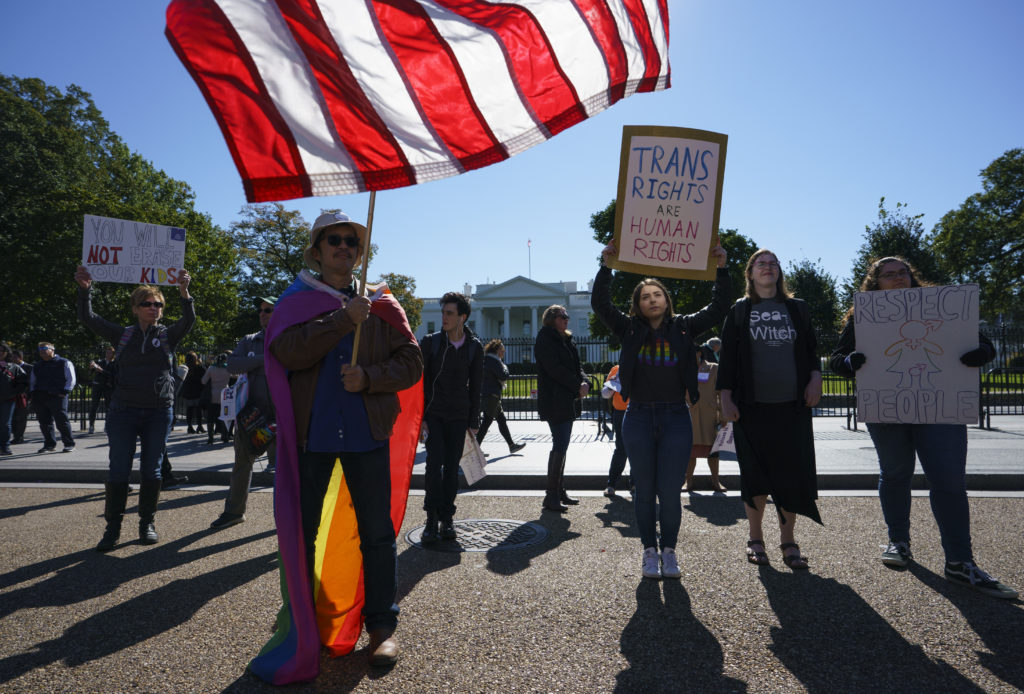
LGBT leaders across the U.S. reacted with fury Monday to a report that the Trump administration is considering adoption of a new definition of gender that would effectively deny federal recognition and civil rights protections to transgender Americans. “I feel very threatened, but I am absolutely resolute,” Mara Keisling, executive director of the National Center for Transgender Rights, said at a news conference convened by more than a dozen activist leaders. “We will stand up and be resilient, and we will be here long after this administration is in the trash heap.” The activist leaders, speaking amid posters reading “#Won’tBeErased“, later addressed a protest rally outside the White House. On Sunday, The New York Times reported that the Department of Health and Human Services was circulating a memo proposing that gender be defined as an immutable biological condition determined by a person’s sex organs at birth. The proposal would define sex as either male or female, and any dispute about one’s sex would have to be clarified through genetic testing, according to the Times’ account of the memo. President Donald Trump addressed the matter briefly as he left the White House for a political trip to Houston, but left unclear how his administration plans to proceed. “We have a lot of different concepts right now,” Trump said. “They have a lot of different things happening with respect to transgender right now — you know that as well as I do — and we’re looking at it very seriously.” Trump added: “I’m protecting everybody.” The Cabinet agency had acknowledged months ago that it was working to rewrite a federal rule that bars discrimination in health care based on “gender identity.” It cited a Texas-based federal judge’s opinion that the original rule went too far in concluding that discrimination based on gender identity is a form of sex discrimination, which is forbidden by civil rights laws. The department said Monday it would not comment on “alleged leaked documents.” It did release a statement from Roger Severino, head of its Office for Civil Rights, saying his agency was reviewing the issue while abiding by the 2016 ruling from the Texas-based federal judge, Reed O’Connor. LGBT activists, who pledged legal challenges if the reported memo leads to official policy, said several other courts had issued rulings contrary to O’Connor’s. “For years, courts across the country have recognized that discriminating against someone because they are transgender is a form of sex discrimination, full stop,” said Diana Flynn, Lambda Legal’s litigation director. “If this administration wants to try and turn back the clock by moving ahead with its own legally frivolous and scientifically unsupportable definition of sex, we will be there to meet that challenge.” Shannon Minter, a transgender attorney with the National Center for Lesbian Rights, called the reported plan a “cynical political ploy to sow discord and energize a right-wing base” before the Nov. 6 election. UCLA legal scholar Jocelyn Samuels, who ran the HHS civil rights office in the Obama administration, said the Trump administration would be going beyond established law if it adopted the policy in the memo. “What they are saying is you do not get to decide your sex; it is the government that will decide your sex,” said Samuels. For LGBT-rights leaders, it’s the administration’s latest attack on transgender Americans. Among the others are an attempt to ban them from military service; a memo from Attorney General Jeff Sessions concluding that civil rights laws don’t protect transgender people from discrimination on the job; and the scrapping of Obama-era guidance encouraging school officials to let transgender students use school bathrooms that matched their gender identities. Omar Gonzalez-Pagan, a lawyer with Lambda Legal, said the proposed rule change appears to still be undergoing White House review. It would need to be signed off by the departments of Justice, Labor and Education, which are also involved with civil rights enforcement. He said “the purpose of this rule is to erase transgender people from existence, to write them off from federal law, and to institute a definition that is contrary to case law, contrary to medical and scientific understanding, and contrary to the lived experience of transgender people.” While social mores enter into the debate, medical and scientific experts have long recognized a condition called “gender dysphoria” — discomfort or distress caused by a discrepancy between the gender that a person identifies as and the gender at birth. Consequences can include severe depression. Treatment can range from sex-reassignment surgery and hormones to people changing their outward appearance by adopting a different hairstyle or clothing. According to an estimate by the Williams Institute at the UCLA School of Law, there are about 1.4 million transgender adults in the United States. Republished with permission from the Associated Press.
Can’t we all agree: Regardless of your position on LGBTQ issues drag queens reading to toddlers is ridiculous?

In today’s, “What in the world are they thinking?” we have the Drag Queens Reading Hour in Mobile coming up. Organizers with Rainbow Mobile, a LGBTQ rights group, is hosting the event. Though their original invitation encourages parents with children as young as three years old to come and hear a drag queen read at story time, there are parents asking if they can bring children even younger than three. I don’t care what your stance on alternative lifestyles is, this is absurd. The Centers for Disease Control hosts a website on developmental milestones. At the age of 4 children often still can’t tell real from make-believe. How does introducing them to a drag queen do anything but confuse them about what to expect in society? In a society where drag queens’ main purpose historically has been to promote a type of personality within the homosexual community (see below study for more on that.) By the age of 5 children are just starting to understand gender, for the purposes of staying on topic I won’t go into my position on the national transgender movement among young kids, except to say I don’t believe science backs up the emotional and developmental ability of young children or early teens to choose their gender identity. Life is already confusing enough to children who are learning basic life skills and basic facts about the world around them why add to it? How is that healthy for the child? I get it if your personal agenda as an adult is to support the LGBTQ community and you want to teach tolerance and acceptance to your children, but to force it upon them before they understand the basics is just plain wrong. To confuse them with the idea that drag queens, or men dressing as women with full hair and makeup, is normal in conventional society is asinine. Cross-dressing is not normal for adult males. Period. We should not raise kids to think something that only happens rarely is the norm. For the purposes of this discussion and for my own general knowledge I spend some time doing research on drag queens. One of the most detailed studies I could find on their lifestyle was published last year in the journal of Evolutionary Psychology (April-June 2017: 1–14). Studying, A Natural History of the Drag Queen Phenomenon Michael Moncrieff and Pierre Lienard noted a few point I think are relevant for this discussion: Drag queens, or female impersonators, differ from transsexuals and individuals with transvestic fetishisms1 in that they are gay individuals who don female clothing with the explicit goal of performing in front of audiences (Schacht, 2000). Drag queens don their costumes primarily to perform at gay bars, nightclubs, and organized competitions (Berkowitz et al., 2007; Schacht, 2002). Their apparel is not intended to depict ordinary female attires like that of transgender women but portray purposefully outlandish, often vulgar, and exaggerated stereotypes of womanhood (Harris, 1995; Tewksbury, 1994). Again, if you’re a progressive parent, I can understand wanting to teach your worldview to your child but that should be done in a way that’s developmentally appropriate. Reading the history and facts about drag queens how can anyone say that a child should be exposed to such a sexually charged subject? We can and we should do better by our children.
T-HEAL to host transgender job fair in Birmingham

A project of the Birmingham Aids Outreach, T-HEAL (which stands for Transgender Help, Empowerment Affirmation and Learning) is hosting a job fair for individuals that identify as transgender, according to AL.com. The event, which will be held at the Magic City Acceptance Center, will take place on August 3 from 10 a.m. until 3 p.m. There, at least eight employers will be taking applications and conducting on-site interviews. “This is Alabama. We can easily be fired before any other person,” project recruiter Destiny Clark, who is also the president of Central Alabama Pride, told AL.com. Clark said “trans individuals face unemployment due to discrimination” in Alabama as the state doesn’t have statewide laws to protect the transgender community, thus T-HEAL is responding to a community need by hosting the event.
ACLU files suit against State of Alabama in transgender license case
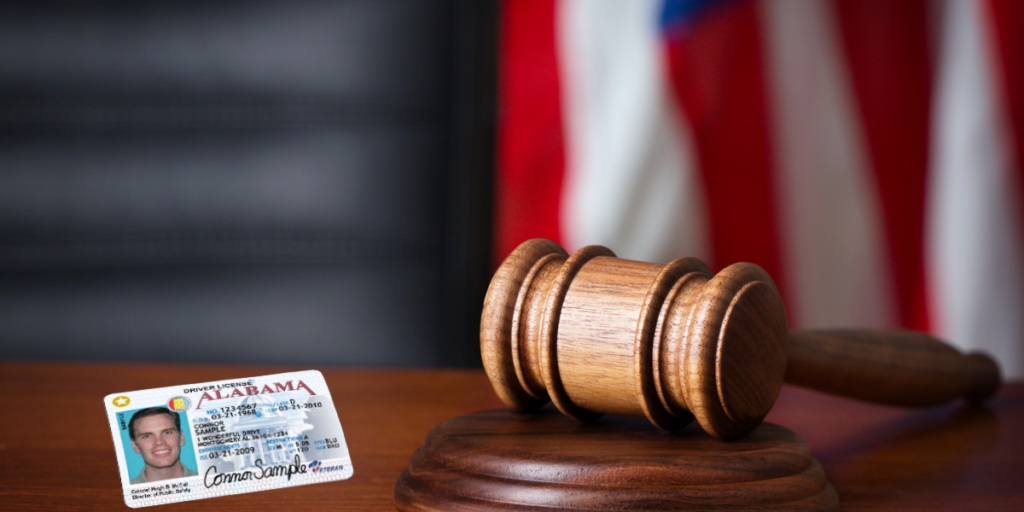
“Mr. Doe experiences distress whenever he sees the gender listed on his own license” states the American Civil Liberties Union (ACLU) lawsuit against the Alabama Law Enforcement Agency (ALEA). The suit was filed on Tuesday and claims the State of Alabama restricts the rights of transgender people by not allowing them to choose which gender their state issued ID identifies them as. Alabama is one of only nine states that requires proof of reassignment surgery before the gender on the state issued ID can be changed. Both trans-rights activists and the ACLU consider this a restriction of the rights of those who identify as transgender who either select not to have the surgery, or are unable to afford it. The ACLU, and two Alabama trans women, Darcy Corbitt and Destiny Clark, believe that by changing this policy trans people will be safer, and more comfortable during everyday activities. “Corbitt was loudly called an “it” in a public area of a crowded driver license office” and “Clark avoids lawful activities that could lead her to have to show her license,” states the lawsuit. According to AL.com, “Eighty percent of the transgender people in Alabama don’t have identification that accurately reflects their gender.” Clark’s motivation behind the lawsuit is to clear a path for younger transgender’s, and to protect them from some of the embarrassment she has experienced. Corbitt believes that the state does not have the right to define their gender identities as their worth. Below is an ACLU video featuring Darcy and Destiny, two of the transgender plaintiffs who are going to court as part of the suit:
Groups seek to halt Donald Trump transgender military policy change

Two LGBT-rights organizations asked a federal judge in Washington on Thursday to bar President Donald Trump from changing the government’s policy on military service by transgender people. The groups, backed by several former military leaders, filed a motion asking the judge to grant a preliminary injunction to keep Trump from reversing course on a 2016 policy change that allowed transgender individuals to serve openly. Trump slammed that change in a memo last Friday and announced he was directing a return to the former policy under which service members could be discharged for being transgender. Trump directed the Pentagon to extend indefinitely a ban on transgender individuals joining the military, and he gave Defense Secretary Jim Mattis six months to come up with a policy on “how to address” those who are currently serving, leaving the door open to permitting their continued service. Until Mattis has made that determination, “no action may be taken against” the currently serving transgender individuals. Trump also directed Mattis to halt the use of federal funds to pay for sexual reassignment surgeries and medications, except in cases where it is deemed necessary to protect the health of an individual who has already begun the transition. Lawsuits challenging the changes have been filed in courts in Washington, Seattle and Baltimore. The Washington lawsuit was filed earlier this month after Trump wrote on Twitter in July that the federal government “will not accept or allow” transgender individuals to serve “in any capacity” in the military, statements that preceded his memo last Friday. The groups behind the lawsuit, GLBTQ Legal Advocates & Defenders (GLAD) and the National Center for Lesbian Rights, say the memo’s changes would violate service members’ constitutional rights to equal protection and due process. As part of the preliminary injunction motion filed Thursday, former military leaders said in court papers that changing the open service policy would be harmful. The former officials – including former Navy Secretary Ray Mabus, former Air Force Secretary Deborah Lee James and former Army Secretary Eric Fanning – served during the Obama administration, which in June 2016 changed longstanding policy to allow troops to serve openly as transgender individuals. Republished with permission from the Associated Press.
Supreme Court scraps case on transgender bathroom rights
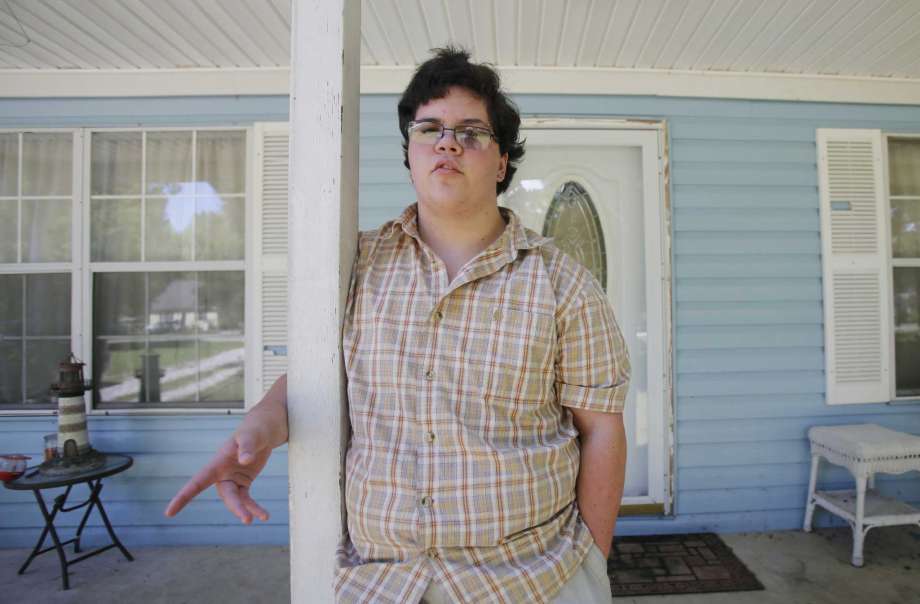
The Supreme Court is returning a transgender teen’s case to a lower court without reaching a decision, leaving in limbo the issue of transgender rights in school settings. Monday’s action comes after the Trump administration pulled back federal guidance advising schools to let students use the bathroom of their chosen gender, not biological birth. The justices said in a brief order that they have opted not to decide whether federal anti-discrimination law gives high school senior Gavin Grimm the right to use the boys’ bathroom in his Virginia school. The case had been scheduled for argument in late March. Instead, a lower court in Virginia will be tasked with evaluating the federal law known as Title IX and the extent to which it applies to transgender students. For Grimm, the order means that he probably will graduate with the issue unresolved and his ability to use the boys’ bathroom blocked by a policy of the Gloucester County school board. Although he won a court order allowing him to use the boys’ bathroom, the Supreme Court put it on hold last August, before the school year began. “This is disappointing for trans kids across the country and for Gavin, who are now going to be held in limbo for another year or two,” said Joshua Block, the American Civil Liberties Union attorney who represents Grimm. “But Title IX means the same thing today as it meant yesterday. Lower courts already have held that it protects trans kids.” Kyle Duncan, the lawyer for the school board, had no immediate comment on the order. The high court action follows the administration’s recent decision to withdraw a directive issued during Barack Obama‘s presidency that said which bathroom to use should be based on students’ gender identity, not biological birth. The administration action triggered legal wrangling that ended with Monday’s order. In essence, the federal appeals court in Richmond, Virginia, had relied on the Obama administration’s interpretation of Title IX to side with Grimm. The appeals court accepted the administration’s reading of the law without deciding for itself what the law and a related regulation on same-sex bathrooms and locker rooms mean. No appeals court has yet undertaken that more independent analysis, and the Supreme Court typically is reluctant to do so without at least one appellate opinion to review, and usually more than one. Similar cases are pending in other parts of the country so it is likely that other appeals courts also will weigh in about the reach of anti-discrimination protections for transgender students. Both sides in Grimm’s case had asked for the high court to go ahead with the case, even after the administration withdrew the Obama-era directive, although the school board said the case should be delayed. The justices did not comment on the case beyond their one-sentence order returning it to the 4th U.S. Circuit Court of Appeals. Republished with permission of The Associated Press.

